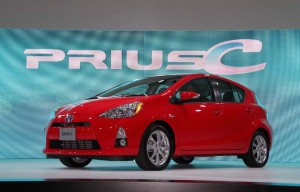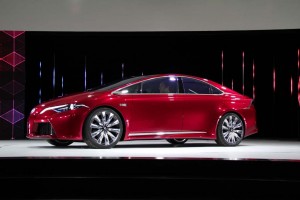 The next few years will be critical if the auto industry hopes to win popular support for new battery-based powertrain technology – rather than just having it mandated by government fiat, said Jim Lentz, Toyota’s top U.S. executive.
The next few years will be critical if the auto industry hopes to win popular support for new battery-based powertrain technology – rather than just having it mandated by government fiat, said Jim Lentz, Toyota’s top U.S. executive.
Lentz spoke during a well-attended news conference where the Japanese automaker outlined its electrification strategy while also rolling out a pair of new battery-based vehicles.
The new Toyota Prius C is the latest member of a growing family of conventional gas-electric models sharing the nameplate of the world’s most popular hybrid. But Lentz also revealed a more advanced plug-in hybrid, the Toyota NS4 Concept, that could reach market later in the decade.
The new subcompact Prius C will come to market about a year after Toyota launched a midsize spin-off dubbed the Prius V. “If the larger Prius V stands for versatility, the Prius C stands for City,” the executive explained.
About 19-inches shorter than the original Prius, it is rated at 53 mpg. It will also become the lowest-cost hybrid on the U.S. market, Lentz declared, with a base price “under $19,000.”
:It’s priced to appeal to young buyers on a budget who until now have found hybrid technology out of reach,” said Lentz.
The new model will be powered by a 1.5-liter gas engine mated to a small gas motor that draws power from a 144-volt nickel-metal hydride battery pack. Together, engine and motor will produce a modest 99 horsepower.
The original Prius is the hybrid equivalent of an 800-pound gorilla, accounting for fully half of all U.S. gas-electric vehicle sales in 2011.
Toyota is slowly testing the water for more advanced technologies and will be bringing out a plug-in hybrid — yielding about 13 miles per charge on battery power alone – this year. Also on tap: a battery-electric version of the RAV4 crossover-utility vehicle, its drivetrain developed for Toyota by California-based start-up Tesla Motors.
Toyota officials have been notably reluctant to embrace more advanced lithium-ion technology but have been slowly bending in the face of stiff competition from the likes of the Chevrolet Volt plug-in and Nissan, Leaf battery car.
According to Lentz, those and other models coming in the next three years will mean “a period of testing consumer response” to alternative, high-mileage technologies.
Toyota is planning some of its own test, the maker announcing at last autumn’s Tokyo Motor Show a plan to bring to market a limited-edition sedan using hydrogen fuel cell technology.
But before wrapping up the news conference, Lentz delivered one last surprise: a concept dubbed the Toyota NS4, which he described as a “dedicated plug-in hybrid separate from the Prius family.”
The vehicle features a striking, aerodynamic design meant to minimize wind resistance and, thus, maximize battery range and fuel economy when operating on gas.
The Toyota NS4 Concept even features a solar cell system to help maintain charge and power the range of onboard electronics that include a variety of advanced safety features, such as what Lentz described as a “3D system” that can automatically decide how best to focus the headlamps to spot obstacles while minimizing glare to oncoming traffic.
“The automobile is being reinvented,” concluded the head of Toyota Motor Sales USA, though it remains to be seen exactly what powertrain technology will win out. The good news, he predicted, is that battery power will become more powerful, smaller and less expensive in the coming year, which should enhance its appeal.

